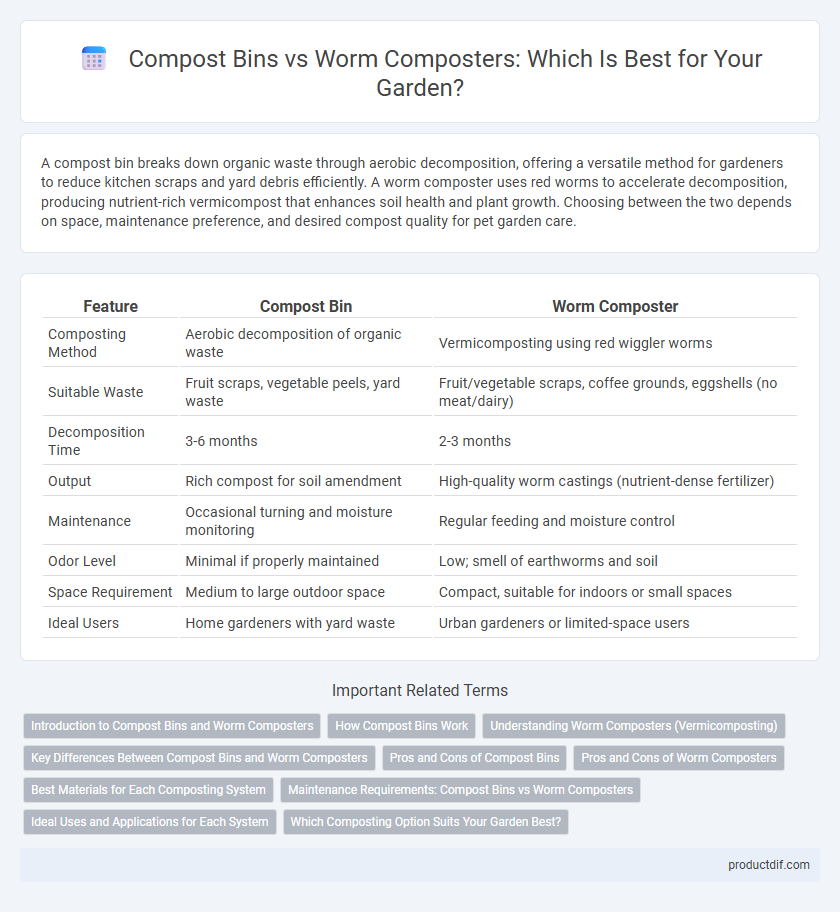A compost bin breaks down organic waste through aerobic decomposition, offering a versatile method for gardeners to reduce kitchen scraps and yard debris efficiently. A worm composter uses red worms to accelerate decomposition, producing nutrient-rich vermicompost that enhances soil health and plant growth. Choosing between the two depends on space, maintenance preference, and desired compost quality for pet garden care.
Table of Comparison
| Feature | Compost Bin | Worm Composter |
|---|---|---|
| Composting Method | Aerobic decomposition of organic waste | Vermicomposting using red wiggler worms |
| Suitable Waste | Fruit scraps, vegetable peels, yard waste | Fruit/vegetable scraps, coffee grounds, eggshells (no meat/dairy) |
| Decomposition Time | 3-6 months | 2-3 months |
| Output | Rich compost for soil amendment | High-quality worm castings (nutrient-dense fertilizer) |
| Maintenance | Occasional turning and moisture monitoring | Regular feeding and moisture control |
| Odor Level | Minimal if properly maintained | Low; smell of earthworms and soil |
| Space Requirement | Medium to large outdoor space | Compact, suitable for indoors or small spaces |
| Ideal Users | Home gardeners with yard waste | Urban gardeners or limited-space users |
Introduction to Compost Bins and Worm Composters
Compost bins are designed to facilitate the aerobic decomposition of organic waste by maintaining optimal temperature, moisture, and airflow for microbial activity. Worm composters, or vermicomposters, utilize specific species like Eisenia fetida to rapidly break down kitchen scraps through worm digestion, producing nutrient-rich castings. Both methods enhance garden soil health but differ in speed, maintenance, and the types of materials suitable for composting.
How Compost Bins Work
Compost bins work by providing an enclosed environment where organic waste such as kitchen scraps, yard clippings, and plant material decomposes through aerobic microbial activity, turning into nutrient-rich compost. They maintain optimal moisture and oxygen levels to accelerate the breakdown process while minimizing odors and pest access. Compost bins vary in design, but most feature ventilation holes to promote airflow, a lid to retain heat, and a solid base to allow drainage and prevent unwanted critters.
Understanding Worm Composters (Vermicomposting)
Worm composters utilize red wigglers or other composting worms to efficiently break down organic waste into nutrient-rich vermicompost, accelerating the decomposition process compared to traditional compost bins. These systems provide a compact, odor-free solution ideal for indoor or small-space gardening, enhancing soil health with beneficial microbes and minerals. Vermicomposting reduces kitchen waste volume by up to 50%, producing high-quality liquid fertilizer (worm tea) that supports robust plant growth in gardens and indoor plants.
Key Differences Between Compost Bins and Worm Composters
Compost bins primarily rely on aerobic decomposition of organic waste by microorganisms, requiring occasional turning and proper moisture levels, while worm composters use red wiggler worms to break down food scraps into nutrient-rich vermicompost. Compost bins handle larger volumes of yard waste and take longer to produce finished compost, whereas worm composters are more suitable for indoor use with kitchen scraps, producing faster, finer castings. Temperature management and odor control differ as compost bins can tolerate higher temperatures but may emit stronger smells, while worm composters maintain moderate temperatures and usually produce less odor.
Pros and Cons of Compost Bins
Compost bins are effective for processing a wide range of garden and kitchen waste into nutrient-rich soil, offering odor control and pest resistance through enclosed design. They require less maintenance compared to worm composters but can take longer to produce finished compost due to slower decomposition rates. Limitations include the potential for slower breakdown of certain materials and bulkier size, which may require more outdoor space.
Pros and Cons of Worm Composters
Worm composters offer efficient organic waste decomposition through vermiculture, producing nutrient-rich worm castings ideal for garden soil enhancement. They require less space and manage kitchen scraps with minimal odor, but necessitate careful temperature and moisture monitoring to maintain worm health. Limitations include slower processing of large volumes and sensitivity to cold or dry conditions compared to traditional compost bins.
Best Materials for Each Composting System
Compost bins are typically made from durable, weather-resistant materials such as high-density polyethylene or recycled plastic, ensuring long-lasting performance and protection from pests. Worm composters favor breathable, non-toxic materials like untreated wood or BPA-free plastic to create a moisture-controlled environment essential for worm health and efficient decomposition. Choosing the right material enhances the effectiveness of each system by optimizing aeration, durability, and microbial activity.
Maintenance Requirements: Compost Bins vs Worm Composters
Compost bins typically require turning and occasional moisture adjustments to maintain aerobic conditions, while worm composters demand consistent feeding of kitchen scraps and monitoring of moisture and temperature to sustain worm health. Regular removal of finished compost is necessary for both, but worm composters tend to produce nutrient-rich castings faster and with less odor. Maintenance frequency and effort vary, with worm composters being more hands-on but efficient, contrasting the lower-maintenance but slower breakdown process of traditional compost bins.
Ideal Uses and Applications for Each System
Compost bins are ideal for handling large volumes of a wide range of organic waste, including yard clippings, fruit and vegetable scraps, and coffee grounds, making them suitable for garden beds and landscape mulching. Worm composters, or vermicomposters, excel in converting kitchen scraps like fruit peels and coffee grounds into nutrient-rich castings, perfect for indoor gardening, potted plants, and small-scale composting needs. Each system serves different scales and waste types, with compost bins favoring outdoor garden waste processing and worm composters tailored for efficient indoor organic matter recycling.
Which Composting Option Suits Your Garden Best?
A compost bin is ideal for gardeners seeking a straightforward method to break down kitchen scraps and yard waste into rich organic material over several months. Worm composters, or vermicomposters, accelerate decomposition using red wiggler worms, producing nutrient-dense castings perfect for small to medium-sized gardens or indoor spaces. Choosing between them depends on garden size, available space, desired composting speed, and the type of waste generated.
Compost bin vs Worm composter Infographic

 productdif.com
productdif.com